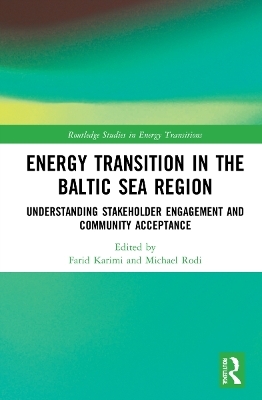
Energy Transition in the Baltic Sea Region
Routledge (Verlag)
978-1-032-00308-5 (ISBN)
This book analyses the potential for active stakeholder engagement in the energy transition in the Baltic Sea Region (BSR) in order to foster clean energy deployment.
Public acceptability and bottom-up activities can be critical for enduring outcomes to an energy transition. As a result, it is vital to understand how to unlock the potential for public, community and prosumer participation to facilitate renewable energy deployment and a clean energy transition – and, consequently, to examine the factors influencing social acceptability. Focussing on the diverse BSR, this book draws on expert contributions to consider a range of different topics, including the challenges of social acceptance and its policy implications; strategies to address challenges of acceptability among stakeholders; and community engagement in clean energy production. Overall, the authors examine the practical implications of current policy measures and provide recommendations on how lessons learnt from this ‘energy lab region’ may be applied to other regions.
Reflecting an interdisciplinary approach in the social sciences, this book is an essential resource for scholars, students and policymakers researching and working in the areas of renewable energy, energy policy and citizen engagement, and interested in understanding the potential for bottom-up, grassroots activities and social acceptability to expedite the energy transition and reanimate democracies.
The Open Access version of this book, available at www.taylorfrancis.com, has been made available under a Creative Commons Attribution-Non Commercial-No Derivatives 4.0 license.
Farid Karimi is a senior researcher and lecturer at the Faculty of Bioeconomy, Novia University of Applied Sciences, Finland. His main research interests are in the social sciences, with a particular focus on the energy transition and energy politics. His articles and interviews have been published in major journals and outlets. Michael Rodi is a professor at the Faculty of Law and Economics, University of Greifswald, Germany. He is also the Director of the Institute for Climate Protection, Energy and Mobility (IKEM). His research focuses include climate law and policy, sustainable energy and transport, and finance and tax law. He is the author of Economic Analysis of Public Law, among other publications.
1. Energy transition in the Baltic Sea Region: Bottom-up activities, stakeholder engagement and social acceptability PART I: Stakeholder engagement and acceptance: A legal framework 2. Active participation in the energy transition: The challenges of European regulation 3. Acceptance issues in the transition to renewable energy: How law supposedly can manage local opposition PART II: Energy policy for engaging people for an energy transition in the Baltic Sea Region 4. Citizen preferences for co-investing in renewable energy: An empirical exploration of the “community-as-investor” acceptance of renewables’ innovation 5. Better off alone? The development of citizen involvement and community energy in the Swedish energy transition PART III: Flexibility options for demand-side, social acceptance and community engagement: Case studies 6. From acceptability and acceptance to active behavioural support: Engaging the general public in the transition of the electric energy system in Finland 7. Engaging the public for citizen energy production in Norway: Energy narratives, opportunities and barriers for an inclusive energy transition 8. Revitalization: Living Lab as a format for accelerating energy transition in Polish rural areas: The case studies of metropolitan outskirts of Gdańsk-Orunia and Lubań 9. Energy clusters in Poland: Towards diffused green energy communities PART IV: Insights from other sectors and regions 10. Actor roles and practices in energy transitions: Perspectives from Finnish housing cooperatives 11. A mixed methods engaged study of divergent imaginaries in Bergen’s mobility transition 12. Co-creating policies on societal transformations as a factor of resilience of modern society Conclusion 13. The power of the grassroots: The Baltic Sea Region, an energy transition laboratory
| Erscheinungsdatum | 08.03.2022 |
|---|---|
| Reihe/Serie | Routledge Studies in Energy Transitions |
| Zusatzinfo | 18 Tables, black and white; 31 Line drawings, black and white; 1 Halftones, black and white; 32 Illustrations, black and white |
| Verlagsort | London |
| Sprache | englisch |
| Maße | 156 x 234 mm |
| Gewicht | 453 g |
| Themenwelt | Naturwissenschaften ► Biologie ► Ökologie / Naturschutz |
| Sozialwissenschaften | |
| Technik ► Elektrotechnik / Energietechnik | |
| ISBN-10 | 1-032-00308-1 / 1032003081 |
| ISBN-13 | 978-1-032-00308-5 / 9781032003085 |
| Zustand | Neuware |
| Haben Sie eine Frage zum Produkt? |
aus dem Bereich


